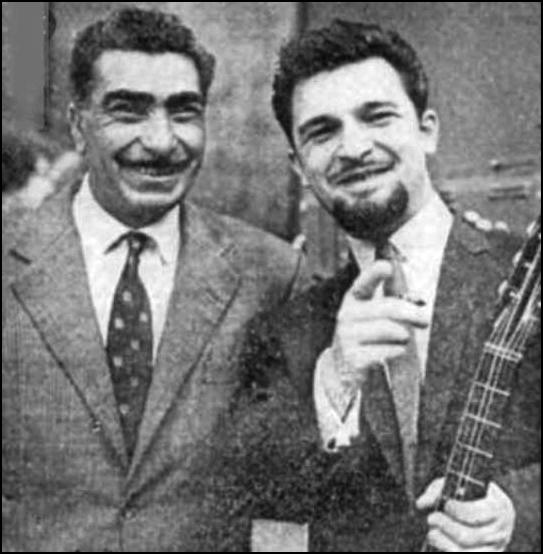| Joseph Reinhardt / Django Club |
Joseph Reinhardt

Joseph "Nin-Nin" Reinhardt (1912-1982) was the younger brother of the famous jazz guitarist Django Reinhardt and played rhythm guitar on most of Django's pre-war recordings, especially those with the Paris-based Quintette du Hot Club de France between 1934 and 1939. From 1943 onwards he also made recordings which show him to be a gypsy jazz stylist of some distinction, and with his own guitar voice somewhat distinct from Django's. He was an early pioneer of the amplified jazz guitar in France and performed for years on a home-made instrument of his own design.
Joseph was born in Paris, France on 1 March 1912, 2 years after his famous brother. As teenagers, Joseph and Django played together as a duo in the courtyards of cafes and in the bals musettes (working class dance halls of the day). Joseph was an original member of the Quintette du Hot Club de France which commenced recording in 1934 and lasted in that form up to the outbreak of world war 2 in 1939. From 1943 onwards he recorded sporadically under his own name and also with Stéphane Grappelli in the latter's "Hot Four". Following Django's early death in 1953, Joseph put away his guitar for a while but emerged to perform in Paul Paviot's short documentary film Django Reinhardt (1957) which also featured Stéphane Grappelli, Henri Crolla and other former associates of Django.
In his late 60s, Joseph was photographed performing at the 1978 Django Reinhardt Festival held in Samois-sur-Seine, which also featured his nephew and Django's first son Lousson, playing an electric Gibson archtop guitar. Previously in the 1950s and 60s, Joseph was noted for playing on an unorthodox electrified guitar of his own construction with which he was an early pioneer of the amplified guitar style in France.
Joseph died on 7 February 1982 at the age of 69. He is buried in the cemetery at Samois alongside Django. His son Kuick (??-2016) was also a musician.
(* 1. März 1912 in Paris, Frankreich; † 7. Februar 1982), genannt Nin-Nin, war ein französischer Musiker und der jüngere Bruder des Jazzgitarristen Django Reinhardt.
Joseph Reinhardt spielte Gitarre und komponierte Stücke im Genre Sinti-Swing oder Jazz Manouche. Zunächst spielte er im Quintette du Hot Club de France die Rhythmusgitarre.
Seit den 1940er Jahren versuchte er, sich in Spielweise und Repertoire von Django abzusetzen. 1942 gründete er sein Orchestre Swing Jo Reinhardt; er nahm mit Gus Viseur („Swing 42“), Hubert Rostaing („L'oeil Noir“) und Alix Combelle („If I Had You“) auf. Dennoch sind viele stilistische Übereinstimmungen vorhanden. Ein musikalischer Begleiter Reinhardts war der Gitarrist Vivian Villerstein.
Auf verschiedenen Fotografien und auch in Filmen ist Reinhardt mit einer Gitarre zu sehen, von der angenommen wird, er habe sie selbst gebaut, ein elektrisches „Flattop“-Modell mit den äußerlichen Merkmalen einer Konzertgitarre. Bereits 1947 in Stéphane Grappellis Hot Four spielte er elektrische Gitarre. Im Quintette du Hot Club de France benutzten alle Gitarristen einschließlich Django Reinhardt dagegen die akustischen Selmer Gitarren.
Ein bekanntes Stück von ihm trägt den Titel Bric-à-Brac.
|
|
|